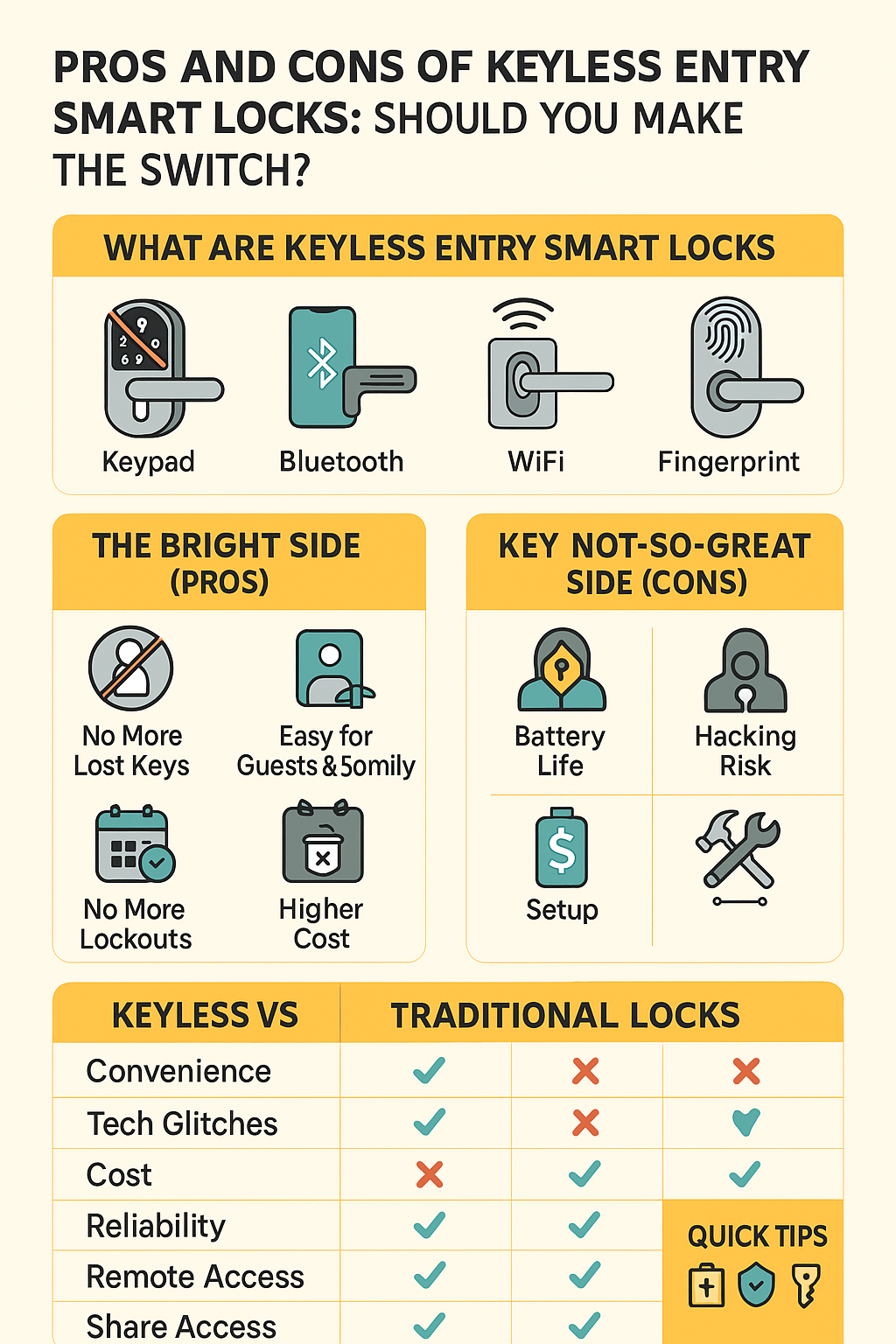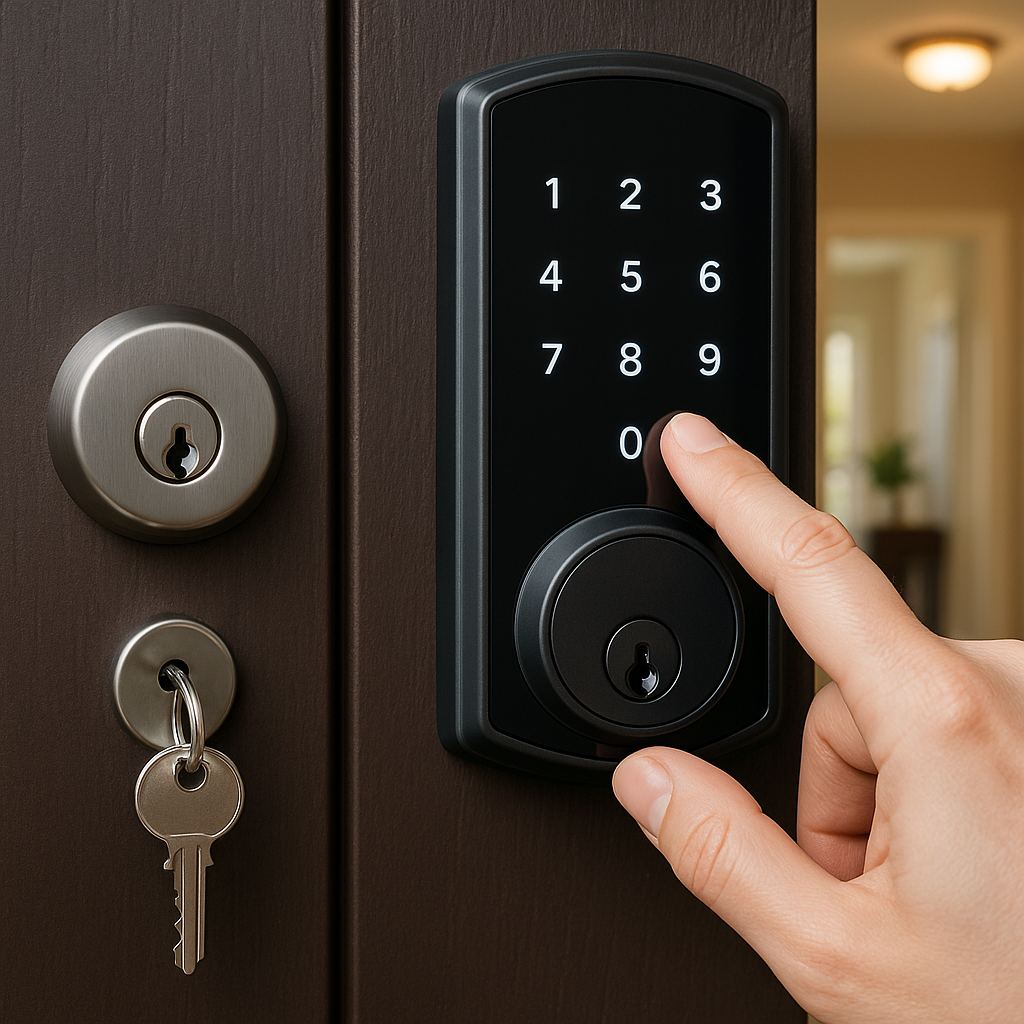Introduction: The Door to a Smarter World
Imagine coming home, your arms loaded with groceries, maybe it’s raining, and you’re fumbling in your pocket for that stubborn house key. Annoying, right? Now imagine simply tapping your phone, entering a code, or just placing your finger on a sensor—and click! The door unlocks. Welcome to the world of keyless entry smart locks.
Smart locks have taken the home security scene by storm. They’re popping up in apartments, homes, rentals, and even offices. But like any shiny new thing, they come with their own set of ups and downs. In this post, we’ll walk you through the real pros and cons of keyless entry smart locks, cut through the marketing hype, and help you decide if these gadgets are right for you. Along the way, you’ll see honest user stories, a little practical advice, and simple answers to big questions—like “Are keyless entry smart locks safe?”
So, let’s swing open the door and step inside!

What Are Keyless Entry Smart Locks?
Before we jump into the pros and cons, let’s clear up what a keyless entry smart lock actually is. In simple terms, it’s a lock that doesn’t need a traditional metal key. Instead, you can use a code, your phone, a key fob, fingerprint, or even your voice to open the door. Pretty futuristic, right?
Types of Keyless Entry Systems
There’s more than one flavor of keyless lock out there. Here are the most common types:
- Keypad Smart Locks: Enter a code on a number pad.
- Bluetooth Smart Locks: Use your smartphone’s Bluetooth to unlock.
- WiFi Smart Locks: Control them remotely over WiFi (even when you’re miles away).
- Fingerprint Smart Locks: Use your fingerprint—like a mini spy movie.
Each type has its pros and cons, which we’ll dive into later. For now, just remember: all these locks promise more convenience, but do they deliver?
The Bright Side: Keyless Entry Smart Locks Advantages
Let’s not beat around the bush—there are plenty of reasons why people are loving smart locks. Here’s why switching to a keyless entry lock could be a game changer for your home, rental, or business.
1. Convenience: Keys? Who Needs ‘Em?
Raise your hand if you’ve ever lost your house keys. (Yep, that’s most of us!) With keyless entry smart locks, you can say goodbye to keychains forever. Just tap, code, or swipe. You’ll never be locked out because you lost a key.
Story Time: Maria, a busy mom from Sacramento, said, “I used to panic every time my kids forgot their keys. Now, I just give them their own codes. No more emergencies or spare keys hidden under the mat.”
Keywords in Action: keyless entry smart locks convenience, benefits of keyless entry smart locks
2. Remote Access: Control from Anywhere
Left the house in a rush? Not sure if you locked the door? With most WiFi smart locks, you can check and control your lock from your phone. Unlock the door for a delivery, let in a friend, or double-check at midnight—all from your couch or even another country.
3. Easy Access for Guests, Renters, and Family
Whether it’s Airbnb guests, house cleaners, or a visiting grandma, giving someone access is easy. No more waiting around with spare keys or copying keys for every visitor. Just send them a temporary code or virtual key.
Case Study: Tom, who rents out his property, shares: “Managing keys was a headache. With a smart lock, I just generate a code for each guest, and it expires after their stay. Super simple.”
Keywords in Action: keyless entry for apartments, keyless entry for homes, keyless entry for rentals
4. Customizable Security and Alerts
Modern smart locks let you track who comes and goes. You can set up notifications when your kids get home or when the cleaning service arrives. Some even let you schedule access (only let the dog walker in from 2–3pm on weekdays, for example).
5. No More Getting Locked Out
Ever locked yourself out barefoot in your pajamas? With keyless locks, as long as you remember your code or have your phone, you’re in. No need to call a locksmith (or break a window).
The Not-So-Great Side: Keyless Entry Smart Locks Disadvantages
Like every coin, smart locks have another side. Before you jump on the bandwagon, let’s talk about the drawbacks of keyless entry smart locks.
1. Battery Life Issues: Power Problems
Most smart locks run on batteries. If you ignore those low-battery warnings, you could be locked out. Some locks beep or send alerts when the battery’s low, but if you’re forgetful, this can be a real pain.
Pro Tip: Mark your calendar to check the batteries every few months—don’t wait for disaster to strike!
Keywords in Action: smart lock battery life issues, keyless entry smart lock maintenance
2. Technology Glitches & Reliability
Ever had your phone freeze or an app crash? Sometimes, smart locks have hiccups too. Software bugs, lost connections, or outdated apps can leave you locked out or unable to lock up. Mechanical locks rarely have these kinds of “bad hair days.”
Keywords in Action: keyless entry smart locks reliability
3. Hacking Risks & Security Concerns
Big question: Are keyless entry smart locks safe? In most cases, yes—if you follow good security practices. But like all tech, smart locks can be hacked, especially if you pick a cheap, poorly reviewed model or don’t update your apps.
Scare Story: There have been reports of hackers using Bluetooth or WiFi vulnerabilities to unlock doors, but most modern locks have stepped up security. Always buy from trusted brands and keep software updated.
Keywords in Action: smart lock hacking risks, keyless entry smart locks security concerns
4. Higher Cost (But Prices Are Dropping)
Smart locks cost more than basic deadbolts—usually between $100 and $300. That’s a bigger bite out of your wallet, especially if you want premium features like fingerprint scanning or full WiFi control. However, as the technology gets more popular, prices are coming down.
Keywords in Action: cost of keyless entry smart locks
5. Installation Can Be Tricky
Some keyless locks are simple to install—just swap out the old deadbolt. Others, especially those with more features, may need professional installation. If you’re not handy, you might need to pay for help.
Keywords in Action: keyless entry smart locks installation
Keyless vs Traditional Locks: The Big Showdown
Let’s stack keyless smart locks up against old-school locks. Here’s how they compare:
| Feature | Keyless Entry Smart Locks | Traditional Locks |
| Convenience | High (no keys needed) | Low (need keys) |
| Security | Advanced, customizable | Basic (can be picked/copied) |
| Cost | Higher (but dropping) | Lower |
| Reliability | Can glitch, needs batteries | Super reliable |
| Remote Access | Yes (WiFi/Bluetooth) | No |
| Sharing Access | Easy (codes, virtual keys) | Hard (key copies) |
| Risk of Lockout | If batteries/app fail | If you lose your key |
Keywords in Action: keyless vs traditional locks comparison
Pros and Cons of Different Keyless Lock Types
Keypad Smart Locks Pros and Cons
- Pros: Easy to use, great for families or rentals, no need for phones.
- Cons: Codes can be shared or guessed, keypad wear can give away the code.
Bluetooth Smart Locks Pros and Cons
- Pros: Unlocks as you approach, works with your phone.
- Cons: Limited range, phone battery must be charged, some models can be vulnerable to Bluetooth hacking.
WiFi Smart Locks Pros and Cons
- Pros: Full control from anywhere, real-time notifications.
- Cons: Needs a strong WiFi signal, more expensive, uses more battery.
Fingerprint Smart Locks Pros and Cons
- Pros: Super quick access, no codes or phones needed.
- Cons: Not always accurate if your fingers are dirty/wet, higher cost.
Real-Life User Reviews: What People Are Saying
- Ayesha (Apartment owner): “Keyless smart locks made life so much easier for my roommates and me. We never have to wait for someone to get home—just use our codes.”
- Mike (Rental host): “I host on Airbnb, and guests love how simple check-in is now. But I did have to remind a guest to shut the door properly, as smart locks don’t always auto-lock if not set up right.”
- Linda (Homeowner): “I was worried about hacking risks, but after reading reviews and picking a trusted brand, I feel much safer than before.”
Keywords in Action: keyless entry smart lock user reviews
Should You Buy a Keyless Entry Smart Lock? Practical Advice
Here’s how to decide if a smart lock is right for you:
- If you often forget or lose keys, or have guests/renters often, a smart lock is a great upgrade.
- If you want to monitor or control your door remotely, go for a WiFi-enabled model.
- If you worry about hacking, choose a top-rated lock and keep the software updated.
- If you’re on a tight budget, watch for sales or opt for a simple keypad lock first.
Pro Tip: Always have a backup way to get inside, just in case technology fails (many smart locks have physical key overrides).

The Future of Keyless Entry Technology
This is just the beginning. New features like facial recognition, voice unlocking, and even smarter AI security are on the horizon. As prices drop and tech gets even better, expect smart locks to become a normal part of every home.
Conclusion: Should You Make the Switch?
When it comes to pros and cons of keyless entry smart locks, here’s the bottom line:
- They’re convenient, secure, and flexible—but only if you pick a good model and stay on top of updates and battery checks.
- They make life easier for busy families, renters, and anyone tired of losing keys.
- The main downsides are cost, battery life, and the (small but real) risk of tech glitches or hacking.
At the end of the day, a smart lock is like a helpful but sometimes moody friend—99% of the time, it’s awesome, but you have to know how to handle the occasional bad day.Ready to level up your home’s security and convenience? Explore the best keyless entry smart locks today, read real user reviews, and choose a model that fits your lifestyle. If you want help choosing, reach out to our team—we’re here to help you lock in peace of mind.
